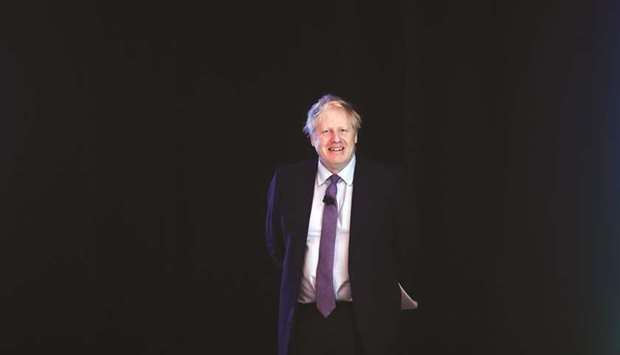Boris Johnson has told business leaders he will shelve a planned cut in corporation tax, claiming he would put £6bn into public services instead.
The prime minister used a speech at the CBI conference to say corporation tax will not be cut from 19% to 17%, and issued a plea for business leaders to show understanding about his priorities.
Johnson’s decision to keep corporation tax unchanged comes as he attempts to distance the Conservatives from being seen as the party of big business, while promising tax cuts for small businesses, such as reducing rates and raising the employment allowance. George Osborne had originally announced the plan to reduce the tax to 17% by 2020.
Labour has relentlessly portrayed the Tories as the party of the wealthy and has promised a number of nationalisations, which they claim would make utilities, railway, broadband and other services work better for the public.
The prime minister’s calculations of the money saved will raise questions about Tory claims that cutting corporation tax does not cost the Treasury money.
Johnson also dropped a heavy hint he would include a major pledge on childcare in his manifesto.
Speaking at a hotel in Greenwich, south-east London, Johnson said the Conservatives were the party of business but cancelling the cut to corporation tax would save £6bn.
“I hope you understand that it is the fiscally sensible thing to do,” he said.
Elsewhere in his speech, the prime minister made a pitch to business leaders that he would get Brexit done and create certainty for them. He said the economy was “like a formula one supercar firing on half its cylinders with so much more natural energy waiting to be unleashed” because Brexit was not completed.
“The country is being held back by politics and parliament,” he said.
Speaking at the same conference, Jeremy Corbyn took a conciliatory approach to the business leaders, saying he was not anti-business and setting out all the reasons that executives should be supportive of a Labour administration.
“It’s sometimes claimed that I’m anti-business,” he said. “That is complete nonsense. It’s not anti-business to be against poverty pay. It’s not anti-business to say the largest corporations should pay their taxes just as smaller companies do. It’s not anti-business to want prosperity in every part of our country and not only the City of London.
“And I say this to business too: if a Labour government is elected on December 12 you’re going to see more investment than you ever dreamed of. You’re going to have the best-educated workforce you’ve ever hoped for. You’re going to get the world-leading infrastructure, including full-fibre broadband you’ve long demanded.
“You’re going to enjoy the fast, reliable transport links you’ve always wanted. You’re going to have the certainty of a customs union and access to the single market, as you’ve long advocated.” Business leaders have expressed reservations about his surprise plans to part-nationalise BT, announced last week, in order to provide free broadband to everyone.
Asked whether he accepted the CBI’s assessment that renationalisation would cause a “chill” for business, he said: “Look, every business has been arguing for years that in order to grow they need good quality broadband … I think it seems to me a fair and good proposal. You accept the principle that there should be universal supply of electricity and postal services. Broadband is absolutely essential to this. I’ve put forward this because I think it is sensible and doable.”
Corbyn also defended Labour’s ambition for a four-day week within the next decade, when asked how it would fit in with ambitions to improve the UK’s lagging productivity.
“The shorter working week that we aspire to will be funded and paid for by productivity increases,” he said.
Jo Swinson, the LibDem leader, also spoke at the conference, promising to scrap business rates and replace them with a commercial landowners’ levy. She also attacked Boris Johnson’s record on standing up for business.

Prime Minister Boris Johnson speaks at the annual CBI conference in London yesterday.


